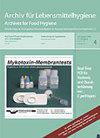Problems for meat and fish business operators in implementing food law in Finland
IF 0.2
4区 农林科学
Q4 CHEMISTRY, APPLIED
引用次数: 5
Abstract
EU and national legislation constantly establishes new obligations for food business operators (FBOs). In order to study the implementation and potential problems in implementing food legislation, a questionnaire was sent to small- and medium-size meat and fish FBOs (n = 904) in Finland found in the register of the National Food Safety Authority Evira. The total response rate was 27.6%. In addition, 18 different FBOs that had gone through the process of approval for meat and fish establishments between 2005 and 2006 were interviewed.The results showed that FBOs in the meat and fish sector have both common and differing experiences of the problems caused by the food legislation requirements. Most common problems concerning food safety legislation are related to the layout of production premises and transport routes, control fees, requirements concerning in-house control, structures and maintenance of premises and varying interpretation of food safety legislation. Small FBOs saw the requirements of food legislation as more onerous than medium-sized FBOs. Small FBOs mentioned the requirements concerning in-house control and approval of the in-house control plan, labelling and traceability as problematic for their operations. On the other hand, medium-sized FBOs experienced problems relating to the requirements for building materials as such, by-products and waste management, in addition to layout of production premises and transport routes, structures and maintenance of facilities and the HACCP system.芬兰肉类和鱼类经营者在执行食品法时遇到的问题
欧盟和各国立法不断为食品企业经营者(fbo)确立新的义务。为了研究食品立法的实施情况和潜在问题,向芬兰国家食品安全局Evira登记册中发现的中小型肉类和鱼类fbo (n = 904)发送了一份调查问卷。总有效率为27.6%。此外,我们还采访了在2005年至2006年期间通过肉类和鱼类场所审批程序的18家不同的fbo。结果表明,肉类和鱼类部门的fbo对食品立法要求引起的问题既有共同的经历,也有不同的经历。有关食品安全立法的最常见问题涉及生产场所和运输路线的布局、管制费用、有关内部控制的要求、场所的结构和维护以及对食品安全立法的不同解释。小型fbo认为食品立法的要求比中型fbo更繁重。小型fbo提到了关于内部控制和批准内部控制计划、标签和可追溯性的要求,这些要求对其业务有问题。另一方面,中型fbo遇到的问题涉及建筑材料本身的要求、副产品和废物管理,以及生产场所和运输路线的布局、设施的结构和维修以及HACCP系统。
本文章由计算机程序翻译,如有差异,请以英文原文为准。
求助全文
约1分钟内获得全文
求助全文
来源期刊

Archiv Fur Lebensmittelhygiene
工程技术-毒理学
自引率
0.00%
发文量
0
审稿时长
>12 weeks
期刊介绍:
The "Journal of Food Safety and Food Quality“ provides a platform for papers including case studies and discussion papers dealing with topics from all areas of food hygiene (food originating from animals) including dairy hygiene, food monitoring, beef cattle and meat examination, meat hygiene and food technology.
 求助内容:
求助内容: 应助结果提醒方式:
应助结果提醒方式:


